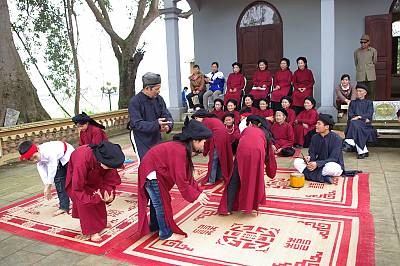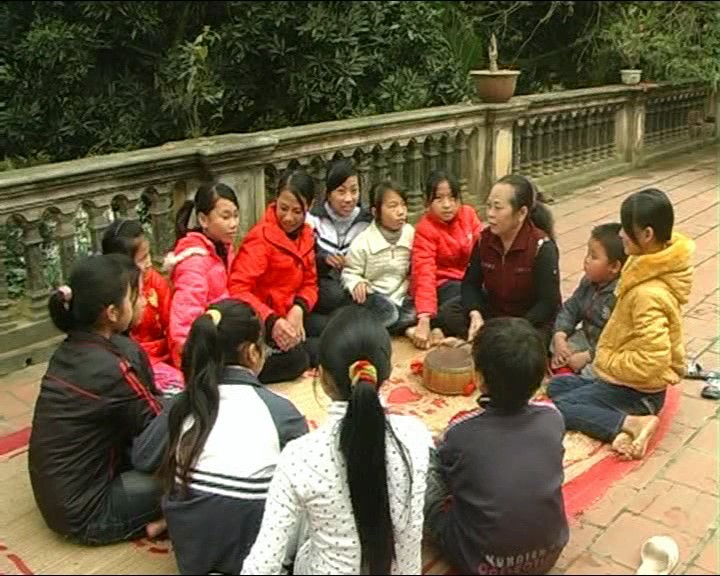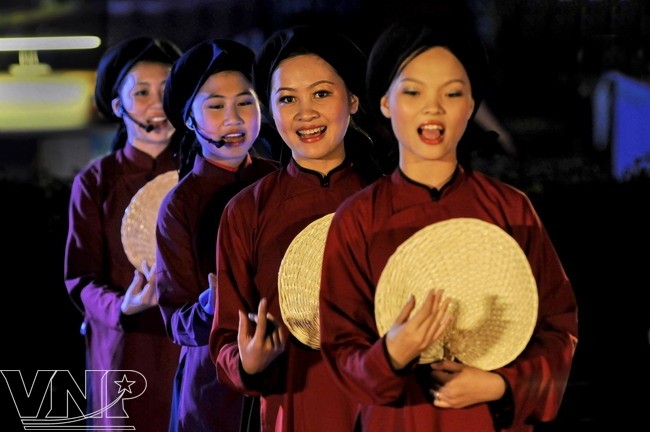(VOVworld) – Each year, in the third lunar month when the atmosphere of the Hung Kings’ Temple Festival is felt on every corner of Phu Tho, Xoan singing is heard in the communes. Xoan singing has been recognized by UNESCO as a world intangible cultural heritage.
These days, the house of Ms Nguyen Thi Lich, a Xoan singing artist from An Thai village, Viet Tri City, is full of laughing and singing. Ms. Lich is the leader of An Thai’s original Xoan singing guild.
 |
| Bói Xoan guild born in 1932, transmitting dances in Xoan singing to his neighboring children (Photo: Vietnamese Institute for Musicology) |
Xoan singing originated under the Hung Kings who founded the Vietnamese nation. There is a story about Xoan singing at that time. After winning a battle, a Hung King conducted a Spring tour with his troops. When they arrived in An Thai village, the wife of the Hung King was pregnant, and when the delivery day came, she was in labor for a long time without being able to give birth. The king was told that there was a beautiful girl named Quế Hoa who could sing and dance beautifully. The King was advised to ask her to sing and dance to help his wife relax and deliver more easily. So Que Hoa was asked to come and sing for the King’s wife. The girl sang and danced around the bed where the king’s wife was in labor. Her crystal-clear voice, like a bird singing, or a stream gurgling, made all the people around utterly fascinated and charmed. The king’s wife forgot her pain and gave birth to three cute sons. The King was very happy and praised Que Hoa and invited her to come and teach the king’s daughters how to sing and dance. Because Quế Hoa sang for the king’s wife in early spring, the king’s daughters called her singing Xoan singing. A slip of the tongue turned the word Xoan into Xuân which means Spring. Ms. Lich adds a further explanation: ‘Xoan singing is a typical form of the traditional arts in Phu Tho province and Vietnam, one which is in urgent need of protection. Xoan singing reflects the traditional customs of the ancestral land of the Hung Kings. It’s often sung in Spring but can’t be called Spring singing, as the name of the King’s wife was Xuan or Spring.’
 |
Ms Nguyen Thi Lich, a Xoan singing artist from An Thai village, opens free-of-charge classes
for children 10 to 15 years old (Photo: viettri.gov.vn) |
For those who were born in Phu Tho province like Ms Lich, Xoan melodies have become an indispensable part of their spiritual life. Ms Lich told us ‘Even 3-year-old children can sing Xoan songs. It looks like one and all men, one and all branches want to sing Xoan tunes. Now if you come to Viet Tri, Xoan singing clubs can be found in every commune.’
Phu Tho is said to have four original Xoan singing guilds in the four ancient villages of Phu Duc, Kim Doi, Thet, and An Thai, with a combined membership of 170 people, 18 of them 80 or older. But across the province, there are only 29 artists who can teach the art to the next generation. Each Xoan music guild is headed by a leader, referred to as the trùm. Male instrumentalists called kép are in charge of setting the tune. Female singers, called đào are responsible for singing in response. Xoan singing is a combination of lyrics and dancing accompanied by musical instruments such as clappers, a variety of drums, and small bottles of wine. Ms Lich introduced the fine character of Xoan singing ‘Xoan singing is a traditional ceremonial art combining singing and dancing with hands and feet. It shows off the gracefulness of the whole body of the singers creating a distinction from other forms of folk art. In Cheo singing or traditional operetta, an artist can bend the fingers but Xoan singing features traditional cultural rituals. The fingers must be bent toward the inside of the palm, opening to the left then to the right instead of bending as in Cheo.’
 |
| Phu Tho Xoan singers (Photo: Tran Thanh Giang) |
The music has been introduced to audiences both at home and abroad through competitions, cultural exchanges, and festivals. In particular, the singing is an indispensable part in the annual Hung Kings’ Temple Festival on the tenth day of the third lunar month. To make Xoan singing live forever, artists like Ms. Lich have been handing down their passion to younger generations. At Lich’s house, classes for children 10 to 15 years old are offered free of charge on Saturday and Sunday evenings. Nguyen Thi Thuy Dung, 12 years old in one of these classes, shared her thought: "Many people at my age don’t like old Xoan melodies. They prefer pop music or something like that. I want to tell them that they should love the art and preserve it, otherwise it will fall into oblivion".
Xoan singing is not only an intangible cultural heritage of the people of Phú Thọ, but an intangible cultural heritage of the entire Vietnamese nation. With its historical and cultural values, Xoan singing should be preserved, safeguarded, popularized, and developed so that this form of folk singing can spread and live on forever.
Phuong Thuy